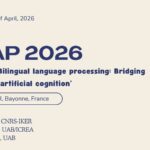5 abril, 2024
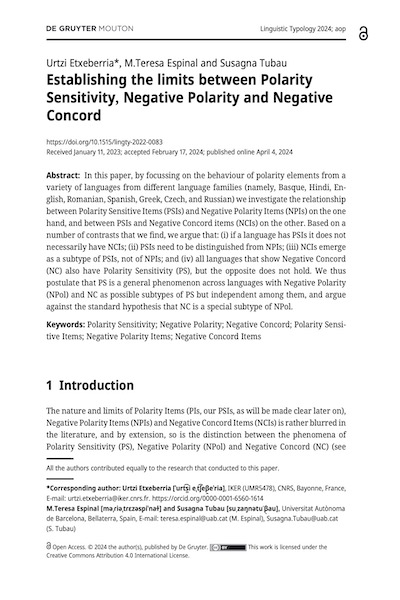
Autors:
Urtzi Etxeberria, M.Teresa Espinal & Susagna Tubau
Títol:
Establishing the limits between Polarity Sensitivity, Negative Polarity and Negative ConcordEditorial: Linguistic Typology (de Gruyter)
Data de publicació: 4 d'abril del 2024
Text completIn this paper, by focussing on the behaviour of polarity elements from a variety of languages from different language families (namely, Basque, Hindi, English, Romanian, Spanish, Greek, Czech, and Russian) we investigate the relationship between Polarity Sensitive Items (PSIs) and Negative Polarity Items (NPIs) on the one hand, and between PSIs and Negative Concord items (NCIs) on the other. Based on a number of contrasts that we find, we argue that: (i) if a language has PSIs it does not necessarily have NCIs; (ii) PSIs need to be distinguished from NPIs; (iii) NCIs emerge as a subtype of PSIs, not of NPIs; and (iv) all languages that show Negative Concord (NC) also have Polarity Sensitivity (PS), but the opposite does not hold. We thus postulate that PS is a general phenomenon across languages with Negative Polarity (NPol) and NC as possible subtypes of PS but independent among them, and argue against the standard hypothesis that NC is a special subtype of NPol.
15 febrer, 2024
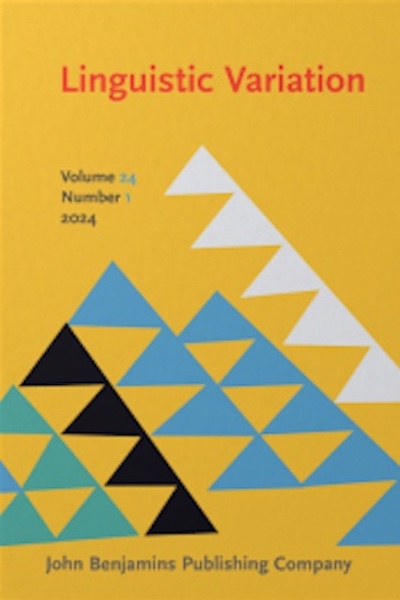
Autors:
M.Teresa Espinal, Cristina Real-Puidgollers i Xavier Villalba
Títol:
From a movement verb to an epistemic discourse marker. The diachronic change of Spanish 'vaya'Editorial: Linguistic Variation (John Benjamins)
Data de publicació: Febrer del 2024
Pàgines: 36 Més informacióBesides its main use as a form of the movement verb ir ‘to go’, the Spanish form vaya (lit. go) is also used as a verbal discourse marker. Here we trace this transition from a purely verbal form to a discourse marker by searching a historical corpus of documents in Spanish, which reveals the increasing use over time of vaya in exclamatives to replace a presentational construction. We focus on vaya in isolation and in combination with an indefinite DP or a bare NP. We analyze the meaning of vaya as an epistemic discourse marker, by means of which the speaker expresses a judgment, a subjective epistemic and evidential evaluation of a proposition accessible from context. We postulate that these constructions sit in a Judgment Phrase at the syntactic-pragmatic interface (Krifka 2020), a position to which vaya also moves when its meaning is that of an expressive intensifier that directly modifies over one or more (contextually salient) properties of the noun contained in the DP/NP.
12 febrer, 2024
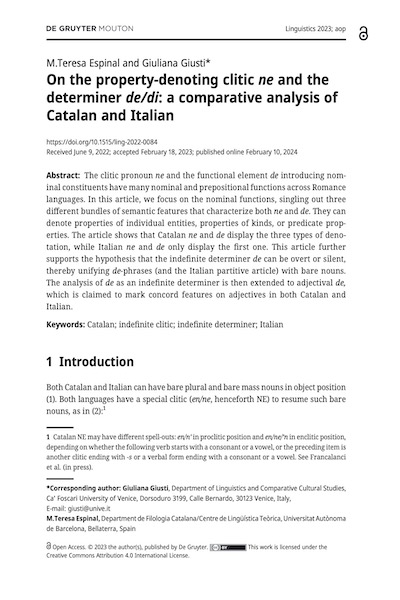
Autors:
M.Teresa Espinal i Giuliana Giusti
Títol:
On the property-denoting clitic ne and the determiner de/di: a comparative analysis of Catalan and ItalianEditorial: Linguistics (De Gruyter)
Data de publicació: 10 de febrer 2024
Text completThe clitic pronoun ne and the functional element de introducing nominal constituents have many nominal and prepositional functions across Romance languages. In this article, we focus on the nominal functions, singling out three different bundles of semantic features that characterize both ne and de. They can denote properties of individual entities, properties of kinds, or predicate properties. The article shows that Catalan ne and de display the three types of denotation, while Italian ne and de only display the first one. This article further supports the hypothesis that the indefinite determiner de can be overt or silent, thereby unifying de-phrases (and the Italian partitive article) with bare nouns. The analysis of de as an indefinite determiner is then extended to adjectival de, which is claimed to mark concord features on adjectives in both Catalan and Italian.
4 setembre, 2023
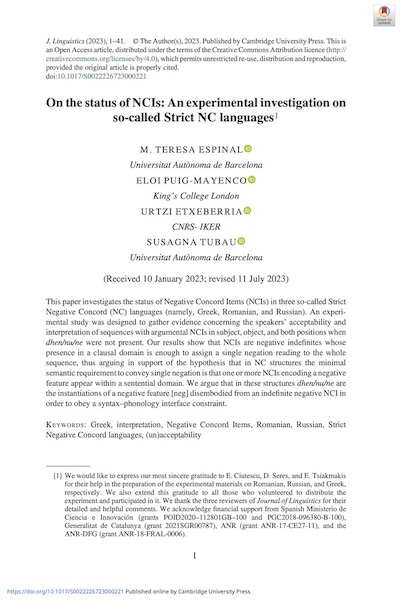
Autors:
M.Teresa Espinal, Eloi Puig-Mayenco, Urtzi Etxeberria i Susagna Tubau
Títol:
On the status of NCIs: An experimental investigation on so-called Strict NC languagesEditorial: Journal of Linguistics (Cambridge University Press)
Data de publicació: Juliol del 2023
Pàgines: 41 Més informacióThis paper investigates the status of Negative Concord Items (NCIs) in three so-called Strict Negative Concord (NC) languages (namely, Greek, Romanian, and Russian). An experimental study was designed to gather evidence concerning the speakers’ acceptability and interpretation of sequences with argumental NCIs in subject, object, and both positions when dhen/nu/ne were not present. Our results show that NCIs are negative indefinites whose presence in a clausal domain is enough to assign a single negation reading to the whole sequence, thus arguing in support of the hypothesis that in NC structures the minimal semantic requirement to convey single negation is that one or more NCIs encoding a negative feature appear within a sentential domain. We argue that in these structures dhen/nu/ne are the instantiations of a negative feature [neg] disembodied from an indefinite negative NCI in order to obey a syntax–phonology interface constraint.
4 setembre, 2023
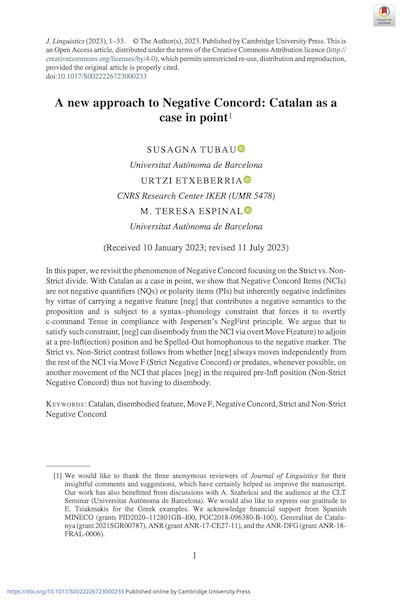
Autors:
Susagna Tubau, Urtzi Etxeberria i M.Teresa Espinal
Títol:
A new approach to Negative Concord: Catalan as a case in pointEditorial: Journal of Linguistics (Cambridge University Press)
Data de publicació: Juliol del 2023
Pàgines: 33 Més informacióIn this paper, we revisit the phenomenon of Negative Concord focusing on the Strict vs. Non-Strict divide. With Catalan as a case in point, we show that Negative Concord Items (NCIs) are not negative quantifiers (NQs) or polarity items (PIs) but inherently negative indefinites by virtue of carrying a negative feature [neg] that contributes a negative semantics to the proposition and is subject to a syntax–phonology constraint that forces it to overtly c-command Tense in compliance with Jespersen’s NegFirst principle. We argue that to satisfy such constraint, [neg] can disembody from the NCI via overt Move F(eature) to adjoin at a pre-Infl(ection) position and be Spelled-Out homophonous to the negative marker. The Strict vs. Non-Strict contrast follows from whether [neg] always moves independently from the rest of the NCI via Move F (Strict Negative Concord) or predates, whenever possible, on another movement of the NCI that places [neg] in the required pre-Infl position (Non-Strict Negative Concord) thus not having to disembody.










